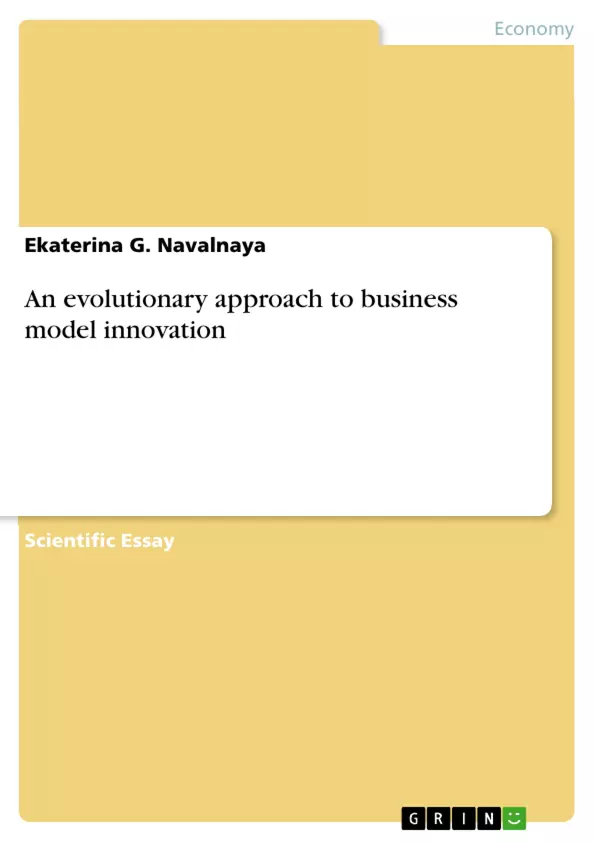In the article it is asserted that business model innovation potential has not yet been fully released first because of a lack of business model definition and a consistent methodological framework, second because, on a more general plan, the whole system of assumptions on which innovation activity of this kind has been based possibly needs re-evaluation. It is argued that a change of theoretical foundation is needed because of systemic inconsistencies which impede present approaches application. It is assumed that difficulties arise due to peculiarities of mainstream economics framework upon which these approaches have implicitly been built. While authors of neoclassical approaches admit outside factors influence on the business model, these factors remain conceptually isolated from the business model. To overcome this problem there has been suggested a framework for business model innovation based on the evolutionary economic theory. The evolutionary approach to business model innovation is characterised by focus on processes of long-term change and economic agents cause-effect relationship. It is being realised by reference to the evolutionary process that has moulded stable patterns of behaviour of companies on a chosen market. By this reference a trajectory of development of value perception and principles of value creation or business models can be traced and understood, since relationship between routines, value, and business models are mutually dependent. Generalised principles of value creation or basic business models of a market in question are to be adjusted to particular circumstances of an
Inhaltsverzeichnis (Table of Contents)
- Introduction
- An Evolutionary Approach to Business Model Innovation
- Introduction
- Business Model Innovation Potential
- Business Model Concept
- Business Model: Theoretical Background
- Evolutionary Economics as a Framework for Business Model Innovation
- Conclusion
Zielsetzung und Themenschwerpunkte (Objectives and Key Themes)
This research aims to develop a methodological framework for business model innovation based on a new theoretical foundation. It argues that the current approaches to business model innovation lack a consistent definition and methodological framework, and that the underlying assumptions need re-evaluation. The research proposes an evolutionary economic theory approach to address these shortcomings.
- The lack of a clear definition and consistent methodological framework for business model innovation.
- The need for a new theoretical foundation for business model innovation.
- The potential of evolutionary economic theory as a framework for understanding business model innovation.
- The importance of considering long-term change and cause-effect relationships between economic agents in business model innovation.
- The role of value perception and value creation in shaping business models.
Zusammenfassung der Kapitel (Chapter Summaries)
The introduction highlights the limitations of existing approaches to business model innovation and the need for a new theoretical framework. It argues that the potential of business model innovation has not been fully realized due to a lack of a consistent definition and methodological framework. The research then explores the evolution of the business model concept, tracing its origins to the earliest models of organizational management and its development through various approaches. The article then focuses on the evolutionary economics framework for understanding business model innovation, emphasizing the importance of long-term change and the cause-effect relationship between economic agents.
Schlüsselwörter (Keywords)
Business model, innovation, evolutionary economic theory, value creation, value perception, long-term change, economic agents, business model innovation potential, methodological framework.
Frequently Asked Questions
What is an evolutionary approach to business model innovation?
It is a framework based on evolutionary economic theory that focuses on long-term change processes and the cause-effect relationships between economic agents.
Why do current business model innovation approaches fail?
The article argues they lack a consistent definition and methodological framework, often relying on neoclassical economics which isolates outside factors from the business model.
What is the role of "routines" in this approach?
Routines, value perception, and business models are mutually dependent; understanding stable patterns of behavior helps trace the trajectory of value creation.
How does value perception affect business models?
The evolutionary process moulds how value is perceived in a market, which in turn dictates the principles of value creation that form a business model.
What is the main objective of this research?
The goal is to provide a methodological framework that releases the full potential of business model innovation by using a more dynamic theoretical foundation.
- Arbeit zitieren
- MA Ekaterina G. Navalnaya (Autor:in), 2014, An evolutionary approach to business model innovation, München, GRIN Verlag, https://www.grin.com/document/281957



